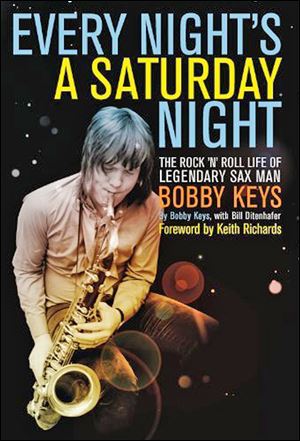
Rocker leaves out a lot of the good stuff
2/26/2012
'Every Night's a Saturday Night: The Rock 'N' Roll Life of Legendary Sax Man Bobby Keys,' by Bobby Keys with Bill Ditenhafer (Counterpoint; 277 pages; $25).
Bobby Keys' rock and roll pedigree is the stuff of legend.
He was Mick Jagger's best man when the Rolling Stones lead singer married Bianca Jagger.
He's been one of Stones' guitarist Keith Richards' closest friends and running mates for 40-some years.
Keys toured with Joe Cocker, hung out with John Lennon during the former Beatle's infamous lost weekend, and when he was a teenager he finagled his way into Buddy Holly's rehearsals in Lubbock, Texas.
The consummate sideman whose saxophone playing has been heard on hundreds of recordings -- he's the guy who blew the iconic solos on Stones tracks like "Brown Sugar" and "Can't You Hear Me Knocking" -- Keys should have a great story to tell.
Unfortunately his foray into autobiography, Every Night's Saturday Night: The Rock 'N' Roll Life of Legendary Sax Man Bobby Keys, comes up far short of delivering the goods, the result of his unwillingness to delve deeply into almost any topic. Much as Ronnie Wood and Richards in their bios maddeningly sum up decades of drug abuse in flippant and often dismissive tones, Keys takes the same approach.
In a short foreword to the book, Richards describes Keys as his "most treasured friend," so you can expect a few tales of debauchery featuring various members of the Rolling Stones, and Keys delivers. But somewhere underlying all that heroin use, heavy drinking, and drug gluttony there has to be some kind of emotional baggage, right?
If there is, Keys isn't sharing. Here's how he describes the band's notoriously decadent 1972 tour when everything revolved around music, touring, girls, and drugs. "I can't really think of any downside to that at all, other than I got to be pretty handy with a syringe, which would later on prove to be my downfall somewhat."
Co-writer Bill Ditenhafer should've pushed Keys to open up more here because the heroin addiction eventually became debilitating, and these kinds of lapses make Every Night's a Saturday Night a generally frustrating read. For example, Keys talks about the first time he heard Buddy Holly playing in his neighborhood and the degree to which the music changed him forever.
Thanks to hearing that early rock and roll, he took up the saxophone and embarked on a single-minded quest to become a working musician. Keys writes about how bad he was at first and how he doggedly worked on his craft to become good enough to eventually be considered one of the most in-demand horn players of his generation.
So you'd think that Holly's death in a plane crash would merit a bit of soul searching, given how important Keys says the author of such rock classics as "Not Fade Away" and "Peggy Sue" was in Texas. Instead, Keys sums up the death with this: "Buddy Holly died in a plane crash on February 3, 1959."
That's it. There's no reaction and Keys moves on to talking about playing with other guys around town.
This kind of punch-pulling renders Keys' bio a minor footnote in Stones lore. He makes a lot of how lucky he often was to be in the right place at the right time and there's a sense that Keys either isn't too deep a person or he's not willing to dish any dirt that might anger his high-profile buddies. Perhaps it's a little bit of both.
When he's writing about sneaking over to Lennon's house to smoke marijuana while Yoko Ono wasn't around -- she didn't approve of her husband hanging out with the boisterous Texan -- or filling a bathtub with expensive champagne in France to frolic with a French model, Keys is at his best.
Unfortunately, there's never any weight to provide ballast to the tales of excess.
Contact Rod Lockwood at: rlockwood@theblade.com or 419-724-6159.